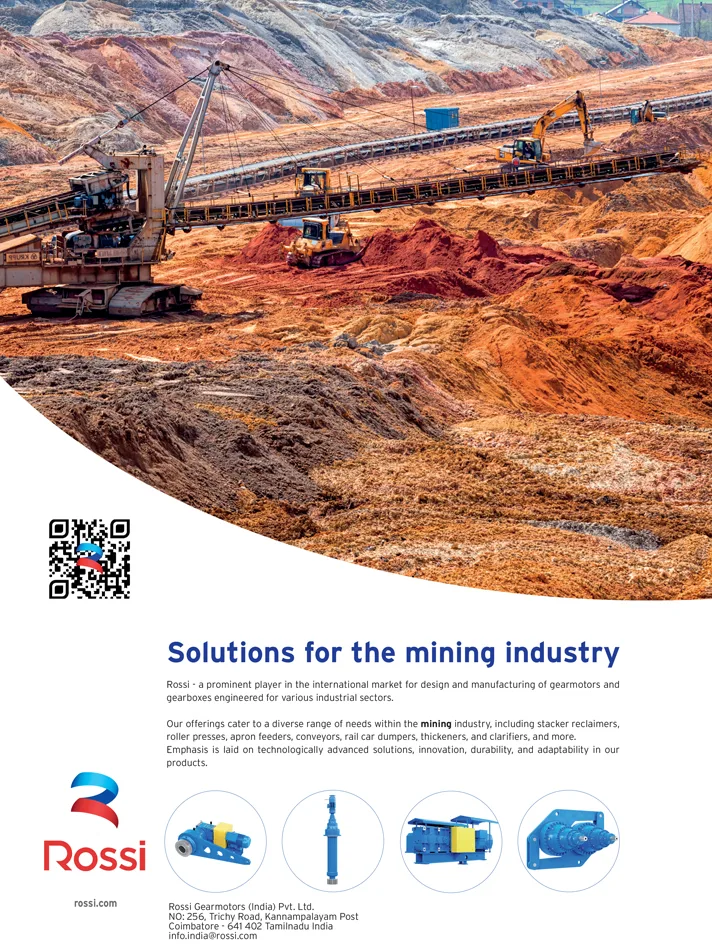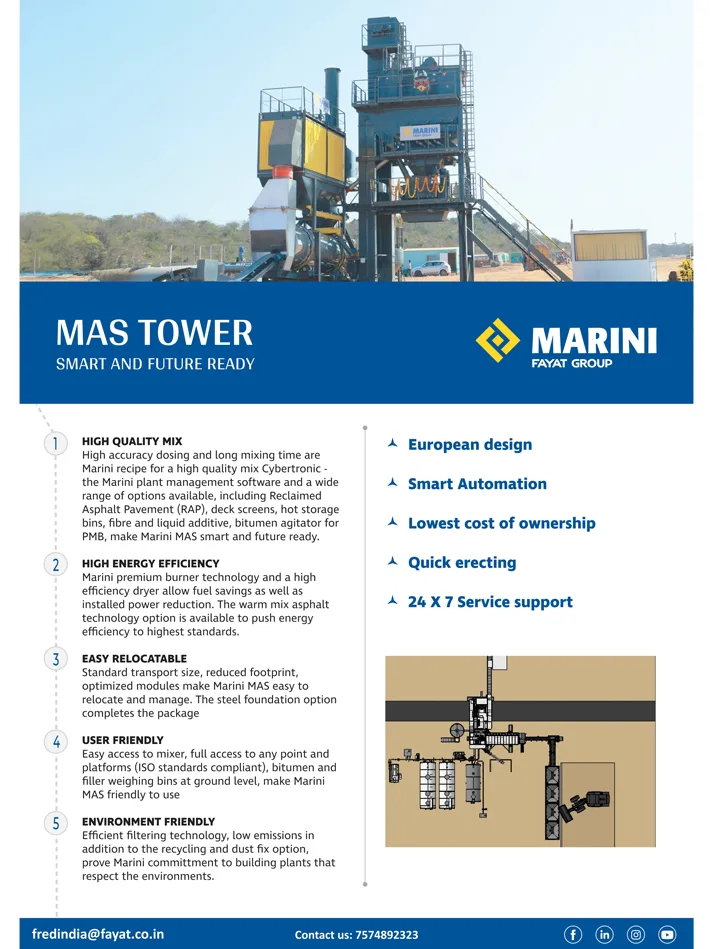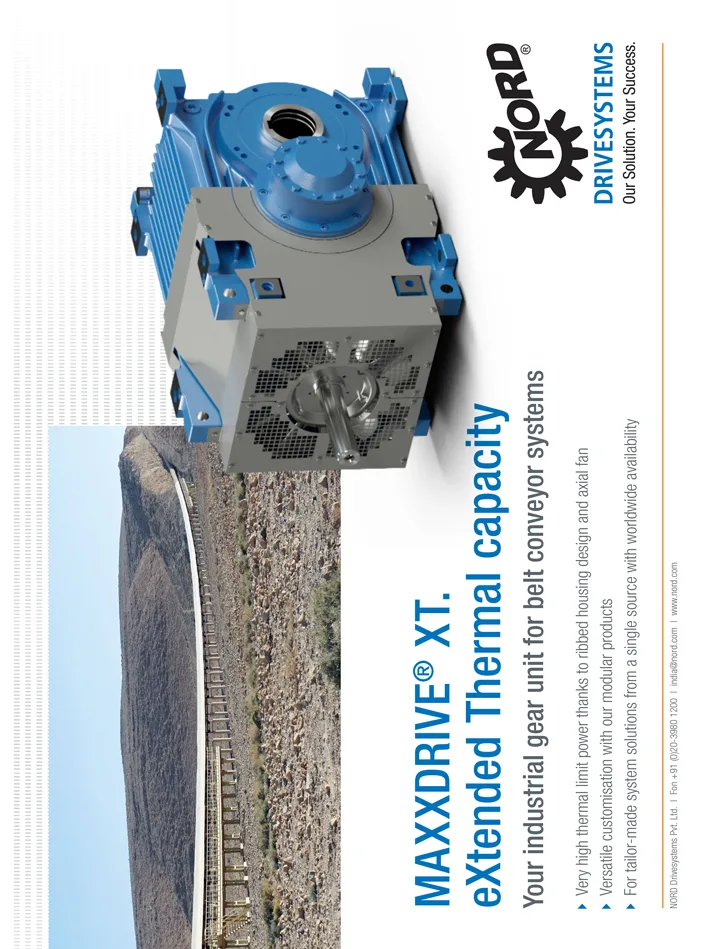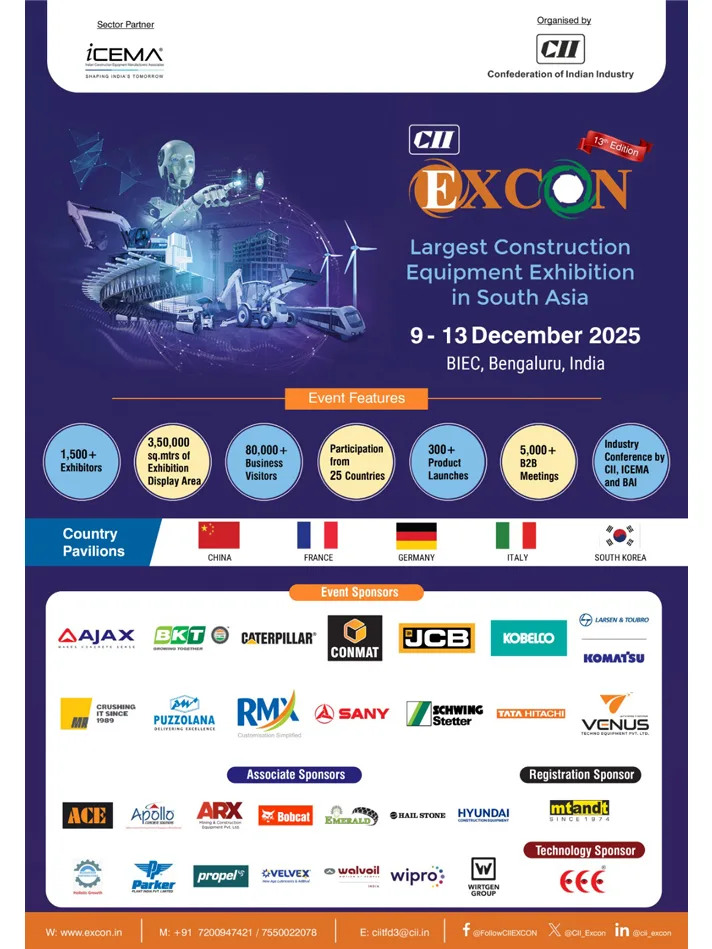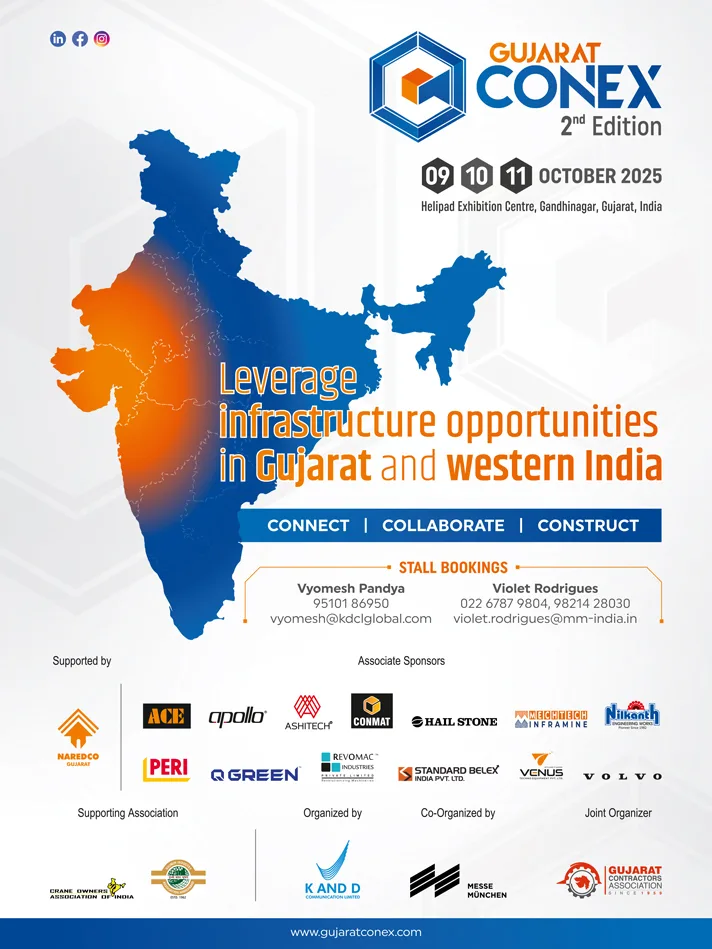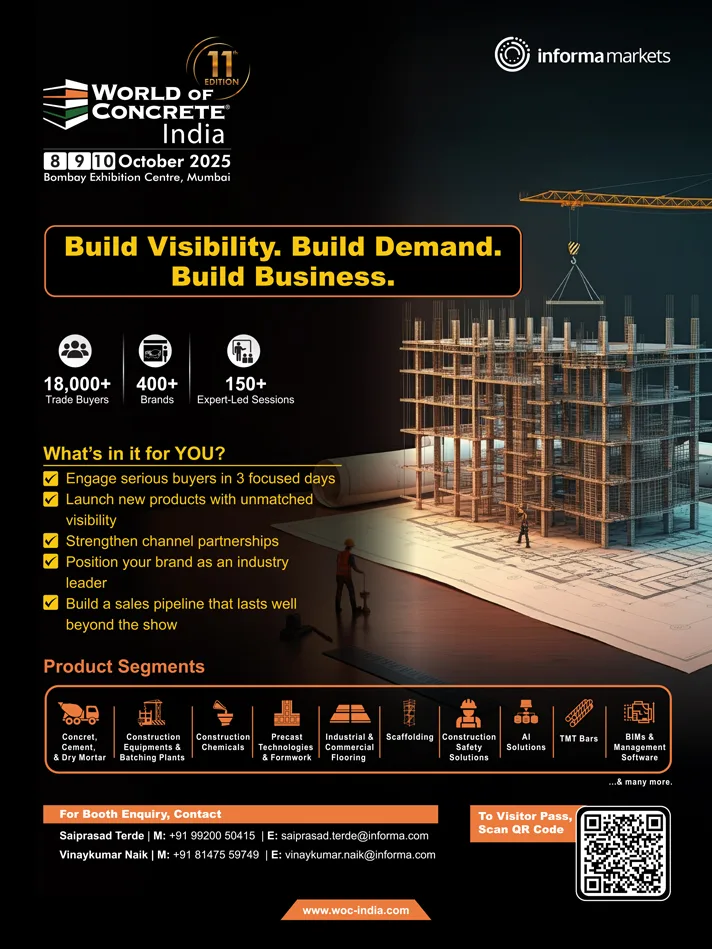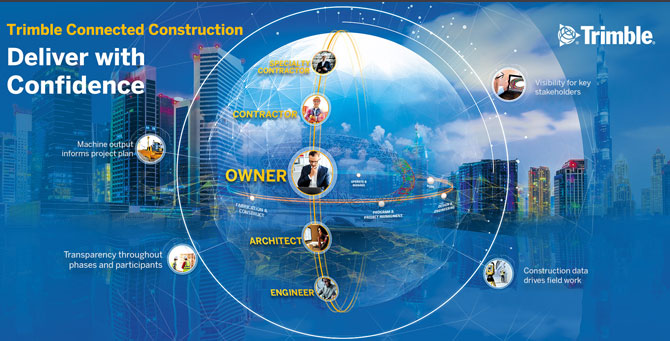
We keep upgrading our offerings to match the evolving requirement of the users

Trimble sets the standard for construction technology by developing highly productive, integrated and innovative solutions for the complete job site. In an exclusive interview to CONSTRUCTION OPPORTUNITIES, HARSH PAREEK, REGIONAL SALES DIRECTOR, INDIA AND SAARC, TRIMBLE SOLUTIONS, gives an over view on the CPM software industry, his company’s unique offerings, USP’s of his company’s products Vis-à-vis competition and a lot more.
Your views on how Digitization and Digital Transformation are Revolutionizing the Construction Industry.
Digitization and digital transformation are propelling the global construction industry into a new age, reshaping traditional ways of doing business and opening new possibilities for enhanced efficiency and profitability.
Thanks to digital transformation, modern construction processes are far more streamlined than ever before. Cloud-based tools have made real-time collaboration, among various project stakeholders and intermediaries, a reality, and decision-making has become more informed. These tools allow project teams to share information in real time, ensuring everyone has access to the latest plans and updates.
Digitization of construction also makes it easier to integrate processes and tools such as Building Information Modelling (BIM) and cutting-edge geospatial technologies and make Scan to BIM a competitive differentiator. This synergistic interplay of various digital tools minimizes errors, reduces rework, and enhances the quality as well as accuracy of finished projects. It also supports lifecycle management, making it easier to maintain and operate buildings long-term.
Digital transformation has also brought significant advancements in construction site management. Drones are now used for site surveys, providing accurate topographical data and monitoring construction progress. It helps speeds up site assessments and reduces risks for workers. Robotics and automation are increasingly employed for repetitive or dangerous tasks, such as bricklaying or heavy lifting, improving safety and efficiency.
Trimble is leading the way in harnessing the power of digitalization and digital transformation in the construction industry. As innovators in delivering innovative technological solutions, we are committed to providing stakeholders with the tools and knowledge they need to succeed in today’s constantly shifting digital environment.
Briefly give us an overview of the CONSTRUCTION & PROJECT MANAGEMENT SOFTWARE industry, the latest trends and the business drivers?
Fueled by the increasing demand for enhanced efficiency, collaboration, and data-driven decision-making in construction projects, the construction and project management software market is undergoing rapid growth. This market encompasses a wide range of applications from Building Information Modeling (BIM) to cloud-based project management platforms, all aimed at streamlining processes and workflows so that projects can be delivered faster and within the allocated budgets.
One of the biggest trends in the industry today is the growing adoption of cloud-based project management platforms that enable real-time collaboration among project teams, regardless of the latter’s location. This shift not only enhances flexibility but also reduces reliance on physical documentation, making information more accessible. Another significant trend is the emergence of integrated software solutions that consolidate various project management functions such as scheduling, budgeting, resource management, and BIM, into a single platform. This integration streamlines project management processes and ensures data consistency across the board.
Mobile applications are also playing a crucial role in the industry, allowing on-site workers to access project information, submit reports, and communicate with the office on the go. This trend improves efficiency and responsiveness, particularly in dynamic construction environments.
Additionally, the use of artificial intelligence (AI) and machine learning is gaining traction in construction design, engineering and fabrication. These technologies enable predictive analytics, risk assessment, and automation, helping project managers anticipate issues and optimize resource allocation.
Sustainability is another important focus area, with software tools designed to monitor and optimize energy usage, waste management, and carbon emissions. This aligns with the growing emphasis on environmentally responsible construction practices.
Key business drivers for this industry include the increasing complexity of construction projects, which demands sophisticated software solutions to manage intricate details and coordinate multiple stakeholders. The need for efficiency and cost control is also a major driver, with companies seeking to reduce expenses and streamline processes.
In essence, the construction and project management software industry is positioned for further expansion, propelled by innovation and a dedication to addressing the challenges of modern construction projects.
Tell us about the solutions and services offered by your firm in the Construction and Project Management space? Brief us about software solution, its applicability to various sectors of construction and infrastructure.
Trimble specializes in technology solutions for the construction and project management space, offering a comprehensive suite of tools designed to enhance efficiency, collaboration, and accuracy across various sectors, from building construction to civil engineering and surveying. Our solutions cater to a broad range of needs across the entire lifecycle of a project, from design and planning to project management and field operations.
One of our flagship offerings is Tekla Structures, which enables construction professionals to create richly detailed and accurate Building Information Models (BIM) of projects. Greater accuracy in BIM models is crucial for fostering better design coordination and collaboration among architects, engineers, contractors, and other stakeholders. With Tekla Structures, project teams can visualize projects in 3D, identify and resolve clashes early, and streamline project workflows. This approach is widely used in building construction, leading to more efficient and accurate project execution.
For project and field management, Trimble offers cloud-based platform in Trimble Connect that facilitates real-time collaboration and communication among project teams. This platform integrates essential project management functions such as scheduling, budgeting, resource allocation, and document management. By centralizing these functions, our solutions make it easier for teams to stay aligned, track project progress, and make informed decisions, whether they’re working on a small project or a large-scale infrastructure development.
Trimble’s technology extends to construction sites with a range of tools that improve accuracy and efficiency. We provide GPS-based positioning systems, total stations, and laser scanning technologies that are used for precise site layout, measurement, and monitoring. These technologies are particularly valuable in civil engineering and infrastructure projects, where accuracy and safety are paramount.
Furthermore, Trimble’s solutions are designed to promote sustainability and environmental responsibility. Our software includes tools for energy modeling and analysis, helping construction teams design more energy-efficient buildings and reduce their carbon footprint.
Does your company offer any specific software for small contractors, kindly elaborate.
Yes, Trimble provides software specifically designed for small contractors, giving them powerful tools to streamline their operations and increase efficiency. One such solution is Trimble Viewpoint, which includes software products such as Viewpoint Team and Viewpoint Field Management.
Viewpoint Team is a cloud-based project management solution that aims to centralize project data, improve communication, and foster collaboration among project teams. It allows small contractors to manage documents, applications, and other project-related information in a single, centralized platform that can be accessed from anywhere with an internet connection.
Viewpoint Field Management is an additional part of Trimble Viewpoint, providing mobile applications enabling field workers to access project information, submit daily reports, track time and labor, and communicate with the office in real time. This helps small contractors to improve field-to-office communication, optimize resource allocation, and increase job site productivity.
What are the USP’s of your products Vis-à-vis competition?
Trimble is the global leader in construction technology and offers the industry’s largest portfolio of hardware, software, and cloud-based services spanning the entire project lifecycle, from planning to execution and maintenance. This comprehensive approach allows for seamless collaboration and data flow across stages, improving efficiency and reducing errors.
Further, Trimble’s solutions are developed with extensive industry knowledge, ensuring that they meet the unique needs and challenges of construction professionals. This domain knowledge leads to practical, effective solutions tailored to the complexities of the construction industry.
Trimble’s products are also scalable and flexible, making them suitable for a wide range of users, from small contractors to large construction firms. These solutions are adaptable, allowing them to accommodate projects of different scopes, types, and complexities, adding value across industries. Finally, the subscription pricing model offered by Trimble for most of its software products make it easier and affordable for even small construction companies to take advantage of our industry-leading software.
Trimble also excels at innovation and technology integration, incorporating the latest technologies such as Building Information Modeling (BIM) and Artificial Intelligence (AI) to provide superior performance and functionality.
Trimble’s dedication to customer support and services ensures that clients receive comprehensive assistance, from initial implementation to ongoing technical support. Our commitment to customer satisfaction strengthens its position as a leader in the construction and project management software industry.
Are you launching any new products and their advantages?
We keep upgrading our offerings to match the evolving requirement of the users. Recently we announced the introduction of 2024 versions of our flagship Tekla software for constructible Building Information Modeling (BIM), structural engineering and steel fabrication management. Boasting an enhanced user experience, Tekla Structures 2024, Tekla Structural Designer 2024, Tekla Tedds 2024 and Tekla PowerFab 2024 let users collaborate with ease through enhanced communication for more integrated, connected workflows between all construction project stakeholders. Improving coordination between all stakeholders on projects is key to ensuring the industry can deliver projects on time, budget and schedule. The Tekla 2024 versions are another significant step in bringing all those stakeholders closer together, and help the as-built environment drive higher efficiency and accuracy.
Which are the important projects with which your software has been associated with. Tell us of the role played by your software in bringing time cost and time overruns in projects with examples from some projects?
Across numerous projects in India, Trimble’s hardware and software solutions have been successfully used in construction and infrastructure development to drive greater accuracy and efficiency. With flagship solutions like Tekla Structures, Trimble aims to transform how the Indian construction industry designs, builds, and maintains buildings and other infrastructure.
To illustrate, the construction of Chenab Bridge in Kashmir, the world’s highest railway bridge, has employed Trimble’s Tekla Structures for modeling throughout its construction. Tekla played a crucial role in streamlining the project, potentially reducing costs and meeting deadlines. Tekla Structures is known to improve overall design and engineering efficiency, leading to cost reduction and adherence to tight schedules in complex projects like the Chenab Bridge.
Recently inaugurated Dwarka Expressway in Delhi is another project where Trimble’s solutions enabled precise grading and earthwork, which in turn minimized costly errors and rework. Our construction management software allowed real-time collaboration and monitoring, helping the project team track progress and stay on schedule. These tools collectively contributed to reducing costs and ensuring that the Dwarka Expressway was completed on time, providing a critical transportation link that supports India’s expanding infrastructure needs.
Another recent iconic project in The Statue of Unity, the world’s tallest statue, required precise planning and execution to meet its ambitious construction schedule. Trimble’s Tekla Structures played a key role in achieving these goals. By utilizing accurate and detailed Building Information Modeling (BIM), the project team was able to coordinate design and construction processes with high accuracy. This allowed for better visualization, reducing errors and rework, ultimately lowering costs. Additionally, Trimble’s solutions facilitated efficient communication among the various teams involved, enabling the project to stay on track and meet its tight deadlines. Trimble’s technology was instrumental in completing this landmark project on time and within budget.
Apart from these, Trimble’s solutions have been used in many other iconic and newsworthy projects in real estate and public infrastructure. We take great pride in providing solutions that ensure timely delivery of even the most complex projects, while simultaneously reducing costs.
What kind of government policy would foster growth of the Construction Software industry in India.
India’s construction sector is already poised to reach USD 3.2 billion by 2027 and presents a significant opportunity for the construction software market. However, a 2023 McKinsey & Company study reveals a technology adoption lag. Government policy can bridge this gap through incentive programs like tax breaks or faster approvals for demonstrably tech-enabled projects, which can encourage wider adoption of cutting-edge technologies and eventually help construction players become more competitive.
Additionally, data standardization efforts, as outlined in the National BIM Standards and Roadmap 2020, would make models and other output from different companies’ software completely interoperable, making technology investments more attractive to construction firms. These efforts would reduce the risks of vendor lock-in and facilitate smoother transitions to digital workflows.
Moreover, expanding Internet connectivity and ongoing digitalization efforts through initiatives like “Digital India” and “BharatNet” is crucial for cloud-based software’s functionality, enabling real-time collaboration and data access. Open data initiatives, as per the Open Data Policy 2020, can empower software companies to develop India-specific solutions, enhancing the local relevance and efficacy of construction technologies.
To ensure a skilled workforce, government investment in training programs and tax breaks for construction software R&D, similar to past IT sector initiatives, would incentivize innovation and boost talent development. Further, dedicated construction technology innovation hubs, modeled after Startup India, could foster collaboration and drive growth.
By implementing these targeted policies, the government can create an environment that propels the construction software industry forward, making it a key driver of India’s construction and economic growth.
Future outlook for the industry and from a company perspective.
The construction industry is currently undergoing a significant transformation with technology playing a central role in shaping its future. From Trimble’s perspective, the future outlook for the construction industry is one of increased digitization, automation, and sustainability.
As construction projects grow in scale and complexity, there’s an increasing need for digital solutions that streamline operations and improve efficiency. Trimble foresees a future where Building Information Modeling (BIM) becomes the industry standard, enabling real-time collaboration among stakeholders. The use of BIM not only enhances project planning and design but also facilitates seamless communication across teams, reducing errors and rework.
Automation will also play a crucial role. Trimble’s advanced technologies, such as robotic total stations, drones, and autonomous machinery, are set to revolutionize construction processes. These innovations can significantly improve accuracy, reduce labor costs, and increase safety, leading to more efficient construction practices.
With a growing emphasis on sustainability, the construction industry is adopting greener practices. Trimble’s solutions support this trend by providing tools for energy-efficient design, material optimization, and waste reduction. The use of digital technologies can help construction companies track their carbon footprint and make informed decisions to minimize environmental impact.
Trimble anticipates that improved connectivity, driven by initiatives like “Digital India,” will enhance the adoption of cloud-based construction solutions. This will lead to greater interoperability among different software platforms, allowing construction firms to integrate various technologies seamlessly.
The future of the construction industry, as we see, is a powerful mix of cutting-edge innovation, greater productivity, and sustainability, with technology driving the sector toward a more connected and environmentally-conscious future.




